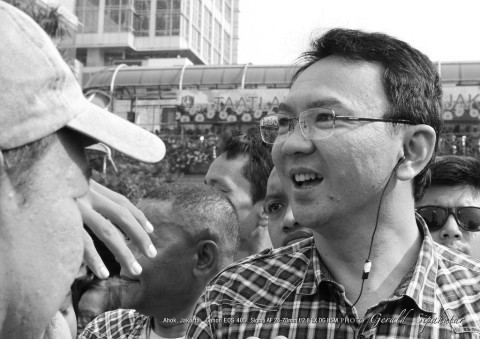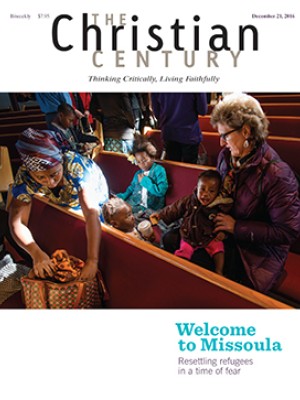A Christian governor in Jakarta
He’s a powerful leader in the world’s largest Muslim nation—and he’s popular, too.

The election of Sadiq Khan as mayor of London created a sensation. A faithful Muslim and the son of humble Pakistani immigrants, Khan received the support of a great many non-Muslim voters, making his election a landmark in European ethnic and religious history. It is quite possible that he might in the future rise to national leadership.
Commentators on the mayoral election often suggested that such interfaith tolerance would never be manifested in Islamic countries. But such pessimists are wrong.
The world’s largest Islamic nation is Indonesia, where Muslims represent a large majority of a population of some 250 million. Christians make up about 10 percent of that number, and relations between the two faiths have on occasion been rocky. Matters reached their worst in the late 1990s, a time of economic crisis and the collapse of the long-standing military dictatorship. During the chaos, Christian minorities in regions like Sulawesi were subjected to ethnic cleansing and Chinese Christians in major cities were targeted for violence and mass rape.
Read our latest issue or browse back issues.
In large part, these crimes resulted from economic grievances—Chinese merchants were targeted as scapegoats. Active Islamist terror movements also appeared, with ties to al-Qaeda. For some years, Indonesia seemed to epitomize Muslim-Christian tensions at their most alarming.
Subsequently, conditions have improved enormously, or rather, reverted to traditional norms of tolerance. Although Christians must be very cautious about any attempts at evangelism, congregations worship openly, and Indonesia is now home to some spectacular megachurches.
The most encouraging manifestation of improved attitudes is Basuki Tjahaja Purnama, who is commonly known by his Chinese nickname, Ahok. Since 2014, Ahok has been governor of the nation’s capital, Jakarta, a city with a population of 10 million, with some 30 million in the larger metropolitan region.
As his name suggests, Ahok is of Chinese origin, and his father came from Guangzhou. Like many Indonesian Chinese, this very powerful leader in a mainly Islamic society is also a Protestant, whose wife bears the distinctively Christian name of Veronica.
Ahok began his career as a mining engineer. He entered politics in 2005 and earned a reputation for his legendary intolerance of corruption. YouTube viewers particularly relished a bracing film of him denouncing venal civil servants in language not often heard in polite Javanese society. He is variously described as tough, combative, and downright rude and is not known to suffer fools. In 2012, Ahok became the running mate of a Muslim leader, Joko Widodo, for the governorship of Jakarta. When “Jokowi” became Indonesia’s president in 2014, his Christian deputy succeeded him in Jakarta.
The religious element may seem surprising. Under Dutch colonial rule, the lands that became Indonesia were critical to Islamic religious and cultural revival worldwide, and the country became home to some very large mass movements. The Nadhlatul Ulama (NU) claims an astonishing 40 million members, and another group, the Muhammadiyah, has a 30 million. These very powerful groups are socially conservative and deeply involved in politics, but they are utterly different from the intolerant Muslim organizations so often found in the Middle East.
For many years, NU’s president was Abdurrahman Wahid, who also served as the president of Indonesia, and who was genuinely devoted to pluralism, religious tolerance, and interfaith dialogue. Wahid was an early supporter of Ahok and actively campaigned for him in his early elections.
Such attitudes proved critical in 2014, when Islamic fundamentalists bitterly opposed the prospect of a Christian ruling over Muslims. The Islamic Defenders Front (FPI) warned Muslims that voting for Basuki Purnama would be sinful, and false rumors even charged that Jokowi himself was a crypto-Christian.
Moderate Muslim groups like NU rejected such agitation, urging that candidates should be judged by their honesty and competence rather than religion. Ultimately, even the firebrand leader of FPI made the remarkable concession that “if a non-Muslim leader is elected [democratically] then I will respect and support that as long as the leader is respectful, polite, honest, and is willing to defend the people.” By common consent, Ahok has been a successful and popular governor who has struggled heroically to solve Jakarta’s overwhelming problems.
Such views have faced severe stress recently. Extremists claim to have found evidence of Ahok uttering anti-Islamic sentiments, provoking mass demonstrations. Hard-line Islamist groups are mobilizing to challenge Ahok in the 2017 gubernatorial elections, albeit through proper democratic activism.
Despite these protests, the fact that Ahok has the position he does is a remarkable tribute to religious attitudes in Indonesia. All in all, the Christian governor of Jakarta would find some interesting things to chat about with the Muslim mayor of London.
A version of this article appears in the December 21 print edition under the title “Jakarta’s Christian governor.”







